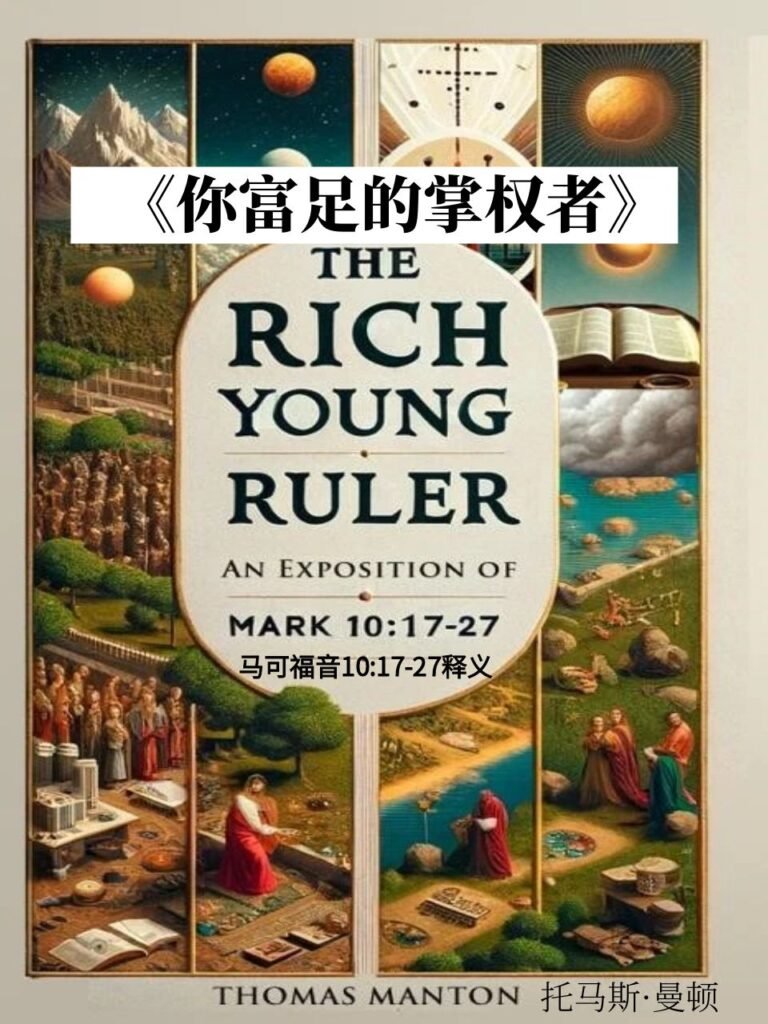|
Getting your Trinity Audio player ready... |
And when he was gone forth into the way, there came one running, and kneeled to him, and asked him, Good master, what shall I do that I may inherit eternal life?—MARK 10:17
当他走上路的时候,有一个人跑来,跪在他面前,问他说:”良善的夫子,我当做什么事才可以承受永生?”——马可福音10:17
中文下载

ANY reigning sin maketh us incapable of faith, and by consequence of salvation, of which we have a notable instance in the conference that passed between Christ and a young ruler of the Jews.
任何统治性的罪使我们无法拥有信仰,因此也就无法得到救赎,对此我们在基督与一位犹太年轻官员的对话中有一个显著的例子。
The story begins in the words read, ‘And when he was gone forth into the way,’ &c.
这个故事开始于所读的经文:”当他出去上路的时候”等等。
The words give an account of a question put to Christ. And here—
这段话讲述了一个向基督提出的问题。在这里—
- The time and place, when and where this question was put to him, ‘When he was gone forth into the way.’
- 提出这个问题的时间和地点是”当他出去上路的时候”。
In the 10th verse we read he was in some private house, where the pharisees did resort to him, and dispute with him about divorce; and ver. 13, ‘They brought young children to him, that he might bless them.’
在第10节中我们读到他在某个私人住宅里,法利赛人来找他,与他争论关于离婚的问题;而在第13节,”他们带着小孩子到他那里,要他给他们祝福。”
Now when he had pleaded their right, and ‘laid his hands upon them, and blessed them,’ Matthew tells us that ‘he departed thence,’ chap. 19:15; and by the wayside, as he was in his journey to some other place, this ruler comes to him.
当他为他们辩护了权利,并”按手在他们身上,给他们祝福”后,马太告诉我们”他就离开那里”,第19章15节;在路边,当他正在前往另一个地方的途中,这位官员来到他面前。
Thus doth our Lord find new occasions of doing good; in the house, and by the wayside.
这样,我们的主找到了行善的新机会;在房子里,也在路边。
Acts 10:38, it is said, ‘He went about doing good.’
使徒行传10:38说:”他周游四方行善。”
The life of Christ was a constant course of service to God and bounty to men; he went about, and he went about doing good.
基督的一生是持续不断地服侍上帝和施恩于人;他四处走动,到处行善。
This is the time and place, when and where.
这就是事情发生的时间和地点。
- The next circumstance is the person by whom the question was put.
- 下一个情况是提出问题的人。
The text saith only, ‘There came one running to him.’
经文只说:”有一个人跑来见他。”
What this one was we shall find by laying several scriptures together.
通过对比几处经文,我们可以发现这个人是谁。
(1.) This one is said to be νἑανίσκος ‘a young man,’ Mat. 19:20;
(1.) 这个人被称为νἑανίσκος(neaniskos,意为”年轻人”),马太福音19:20;
(2.) Πλούσιος ‘a rich man,’ ver. 22, ‘He had great possessions.’
(2.) Πλούσιος(plousios,意为”富人”),第22节,”他有许多产业。”
(3.) Ἄρχων, ‘a ruler,’ Luke 18:18.
(3.) Ἄρχων(archon,意为”官员”),路加福音18:18。
What is meant by that?
这是什么意思呢?
Possibly one of the chief pharisees, for they were called ἄρχοντες, rulers, Luke 14:1, or a ruler of the synagogue; or, as Grotius thinks, one of the magistrates of his town, or rather the head and chief of his family.
可能是法利赛人的一位首领,因为他们被称为ἄρχοντες(archontes,意为”官员”),路加福音14:1,或是会堂的管理者;或者,正如格劳秀斯(Grotius)所认为的,是他所在城镇的一位官员,或者更可能是他家族的首领和族长。
The honourable families among the Jews had their heads and chiefs, whom they called their rulers.
在犹太人中,显赫的家族都有他们的首领和族长,他们称这些人为官员。
Now such a ruler, a young man, an honourable person, a head and chief of his family, he comes to Christ, and puts this question to him.
现在,这样一位官员,一个年轻人,一个尊贵的人物,一个家族的首领和族长,他来到基督面前,向他提出这个问题。
- The manner of his address to Christ; it was voluntary, ‘He came,’ saith the text, that is, of his own accord.
他对基督说话的方式是自愿的,经文说”他来了”,就是说他是自愿前来的。
It was zealous and earnest, ‘He came running to him.’
他满怀热忱和诚恳,”他跑向他。”
It was humble, ‘He kneeled down to him;’ and besides, it was civil and respectful; he calls him ‘Rabbi,’ and gives him the title of ‘good,’ ‘Good master.’
他很谦卑,”跪在他面前”;此外,他很有礼貌且恭敬;他称呼他为”拉比”,并给予他”好”的称号,”良善的夫子。”
He comes with a kind compellation which shows his reverence and respect to Christ.
他带着这样亲切的称呼来,显示出他对基督的敬畏和尊重。
This was the manner of his address.
这就是他求见的方式。
- The question itself, which is weighty and serious, ‘What shall I do to inherit eternal life?’
这个问题本身很重要且严肃,”我该做什么才能承受永生?”
Out of all these circumstances take this observation—
从所有这些情况中得出这样的观察—
Table of Contents
目录
Sermon I. “And when he was gone forth into the way, there came one running, and kneeled down to him, and asked him, saying, Good master, what shall I do that I may inherit eternal life?”
讲道一:”耶稣出来行路的时候,有一个人跑来,跪在他面前问他说:良善的夫子,我当做什么事才可以承受永生?”
Sermon II. “And Jesus said unto him, why callest thou me good!”
讲道二:”耶稣对他说,你为什么称我是良善的!”
Sermon III. “Thou knowest the commandments,”
讲道三:”诫命你是晓得的,”
Sermon IV. “And he answered and said unto him, Master,”
讲道四:”他就回答说,夫子,”
Sermon V. “Now Jesus, beholding him, loved him,”
讲道五:”耶稣看着他,就爱他,”
Sermon VI. “One thing thou lackest,”
讲道六:”你还缺少一件,”
Sermon VII. “And come, take up the cross, and follow me”
讲道七:”你来背起十字架,跟从我”
Sermon VIII. “And take up the cross,”
讲道八:”背起十字架,”
Sermon IX. “And he was sad at that saying,”
讲道九:”他听见这话就忧愁,”
Sermon X. “And Jesus looked round about,”
讲道十:”耶稣周围一看,”
Sermon XI. “And the disciples were astonished at his words,”
讲道十一:”门徒听见这话就希奇,”
Sermon XII. “It is easier for a camel to go through the eye of a needle,”
讲道十二:”骆驼穿过针的眼比这容易,”
Sermon XIII. “And they were astonished out of measure,”
讲道十三:”他们就更加希奇,”
Sermon XIV. “And Jesus, looking upon them, saith,”
讲道十四:”耶稣看着他们说,”
Sermon XV. “With God all things are possible,”
讲道十五:”在神凡事都能。”